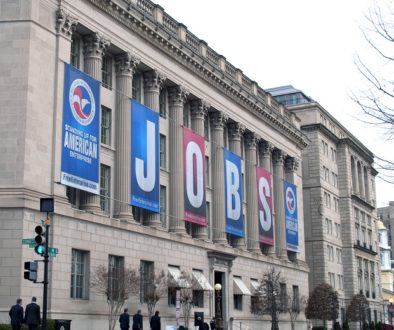By Opposing H.R. 1, the “For the People Act,” the Chamber Says Democracy Should Belong to Corporations, Not Voters
On Friday, the most sweeping anticorruption legislation since the Watergate era passed through the U.S. House of Representatives by a vote of 234-193. This democracy reform bill, otherwise known as H.R. 1 or the “For the People Act,” has multiple aims: to ensure that our voting and electoral systems are protected and satisfy the “one person, one vote” principle; to crack down on rampant corruption and kleptocracy in Washington; and to reduce the role of corporate money in politics. Among other reforms, the bill calls for an end to gerrymandering, more transparent and open government requiring corporate disclosure of political spending, and partial public financing of elections to lessen the power of the ultra-wealthy donor class in determining who wins elections in U.S. politics.
To the U.S. Chamber of Commerce, this bill essentially means a disruption in the established way of doing business in Washington—the status quo in which the Chamber and its corporate cronies have outsize influence over who gets elected and what legislation is passed. Therefore, it’s no surprise that the Chamber sent out what it called a “Key Vote Alert!” to all House members shortly before the vote was scheduled to take place, urging them to vote no on this bill that is vital to repairing our democracy. As the largest lobbying entity in the United States and a prodigious campaign spender, it is no surprise to see the Chamber sticking its head out on such an ambitious bill that would drastically reduce the influence of corporate money in politics.
While the bill passed through the House despite the Chamber’s protestations, U.S. Senate Majority Leader Mitch McConnell (R-KY) has stated he does not intend to bring the bill to a vote on the Senate floor, on the flimsy grounds that “I get to decide what we vote on.” Nevertheless, H.R. 1 is expected to be introduced to the Senate later this month, and sufficient public pressure to pass this wildly popular bill could force McConnell into conceding that withholding these sorely needed reforms from even getting a vote is an untenable position. You can bet your bottom dollar—and every other dollar you have—that the Chamber will be hard at work to keep McConnell from letting the American people’s representatives in the Senate have a say in whether or not it passes—so as to protect the millions of dollars it invests to try to sway elections.
In the text of the alert the Chamber sent to House members before the vote, the Chamber claims that American democracy “benefits from the robust participation of its citizens — whether they choose to engage individually at the ballot box or collectively through a party, association, or corporation.” By referring to corporations in the context of “citizens,” the Chamber is invoking the notion of supposed “corporate personhood.” Notably, the Chamber also recoils at the idea that the bill would “have the practical effect of prohibiting associations, corporations, from engaging in the political process.” This is an uncharacteristic instance of the Chamber, usually careful to keep up the charade that it exists primarily to benefit small businesses, “saying the quiet part loud.” The Chamber exists to promote the interests of corporations and the ultra-wealthy, but rarely does it admit to such so blatantly.
The reality is that voters do not believe that corporations are people and believe that corporations have “too much power” over politicians. By claiming that corporations have some unassailable right to a voice in our politics—which, due to the massive amounts of money corporations and their representative associations like the Chamber pour into lobbying and political advertising, inevitably drowns out the political voices of average Americans—the Chamber is making an argument that the public fundamentally disagrees with in an effort to convince the very same lawmakers whose coffers it lines that they benefit from the present system.
Elsewhere in the alert, the Chamber argues that H.R. 1 would place unreasonable burden on the kinds of “issue ads” (effectively, campaign ads in disguise) corporations are allowed to air. Likewise, it claims that the bill’s requirement that organizations must disclose communications with candidates or elected officials is “onerous.” This is clearly a bad-faith argument; the Chamber knows full well which of its “issue ads” should rightfully be considered campaign ads, and the disclosure requirement is a very simple way of shining sunlight on who is really funding the ads and potential conflicts of interest held by our elected officials. But as per usual, the Chamber paints itself as the put-upon victim of some overly harsh punishment rather than the truth—that it is a massive spender in American politics and it simply wants to maintain the status quo where it can safely influence elections and legislation out of public sight.
Luckily, the fate of H.R. 1 is not pre-ordained. No matter how much Sen. McConnell and the U.S. Chamber may want to deny the people the right to the kinds of reforms to our broken political system that they desperately want and need, they do not hold all the cards. By urging your senator to co-sponsor the bill when it is introduced in the Senate later this month, and to publicly demand that McConnell bring the bill to the floor for a vote, we can show that our democracy really is “for the people”—and no, “the people” does not include corporations.
U.S. Chamber Watch is a project of Public Citizen. If you’d like to learn more about the Chamber, you can always visit us on www.chamberofcommercewatch.org or follow us on Facebook and Twitter.




